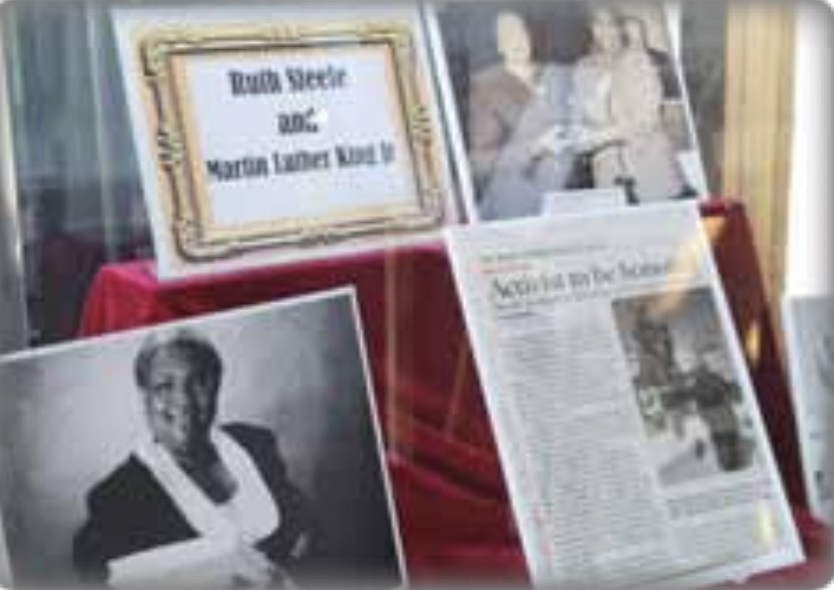Outside of Pueblo, Colorado, the name James Pierson Beckwourth or Beckwith as it has also appeared, has little modern resonance. Beckwourth was born into slavery in 1798. His father was white, his enslaved mother, African American. Beckwourth’s father freed him in his teen years so that he could apprentice with a local blacksmith. It would be a skill he would add to a handful of others over the course of his life, including Army scout, fur trapper and trader, professional gambler, cowboy and merchant. It was as a merchant that he came to Colorado and where he is often credited with establishing the first trading post in what would become Pueblo in 1842.

But while Beckwourth’s name is, perhaps, more ephemeral in Pueblo than topical, that is not the case for another local Pueblo legend, the late Ruth Steele, an African American woman who dedicated her life to making certain Black history would be far more than a 28-day annual commemoration. Miss Steel died in 2021 but her story remains one of Pueblo’s most endearing and important for African Americans and everyone else who calls the southern Colorado city home.
The story of Ruth Steele began in Texas in 1935. But two weeks after she was born, her family brought her to Pueblo where she was raised and where she would make her mark by her grandmother. The precocious young woman skipped a couple of grades allowing her to graduate from Centennial High School at age 15. She would later earn degrees from then Pueblo Junior College and later the University of Colorado. Professionally, she was a paralegal. But her passion, her life’s work, was civil rights.
As a young woman she was in Washington for Dr. Martin Luther King, Jr’s, “I Have A Dream,” speech. In an interview with The Pueblo Chieftain, she would modestly recall how she “had been one of the ladies sent to Washington to set up for the historic speech. Later, in 1965, she was in Selma, Alabama, marching with King and others on ‘Bloody Sunday,’ as they crossed the Edmund Pettis Bridge.
Miss Steele counted among her friends King’s wife, Coretta, also the late Congressman John Lewis and civil rights advocate and entertainer Harry Belafonte. The red dress she wore for the iconic ‘Dream’ speech and later in Selma were keepsakes until the day she died.
After King’s assassination in 1968, Miss Steele worked relentlessly to honor the King name and ensure that Black his- tory and civil rights remain beacons of both light and hope in Pueblo and southern Colorado.
She along with other members and friends of Pueblo’s African American community lobbied former Denver Mayor Wellington Webb to donate a statue of Dr. King standing with Emmett Till, a fourteen-year-old Black boy savagely killed in 1955 for allegedly whistling at a White woman in a Mississippi dime store. The statue was removed from Denver’s City Park and now resides in Pueblo where it sits outside of another of Miss Steele’s passions, The Lincoln House, a home that once served as an orphanage to African American children and seniors, mostly older women.
The structure, now restored after years of inattention and long past its days as an orphanage, is known as Friendly Harbor, a mental health services center. Its role as an orphanage ended in 1963. But in its heyday, it provided shelter for African American orphans who came from as many as seven different states. It is also listed on the State Register of Historic Properties.
In 1983, President Ronald Reagan signed legislation mak- ing January 15th, Dr. King’s birthday, a national holiday. But the law making it official did not take effect until 1986. Again, Miss Steele found herself working in Pueblo and Denver to get Colorado lawmakers to do the same and make MLK Day a Colorado holiday. She and friends successfully staged the first in the nation Dr. Martin Luther King, Jr., program in Pueblo two years before the first official MLK holiday.
Miss Steele died one day after the 2021 MLK March in Pueblo. Her illness, however, did not stop her from taking part in the program she had ushered in more than thirty years earlier. From her hospital bed, she listened to the speeches at the Pueblo march and the later the formal program over the telephone.
Friends who knew and worked with Miss Steele said she lived her life in accordance with words from one of Dr. King’s favorite hymns, “If I Can Help Somebody.”
“If I can help somebody, as I pass along…if I can cheer somebody with word or song…then my living shall not be in vain.”
It is not a place one thinks about when the topic of Black History Month comes up. No surprise, Pueblo, Colorado, a city of roughly 112,000, has only a 2.4 percent African American population. We pay tribute to those Black Americans who helped shape Pueblo.



